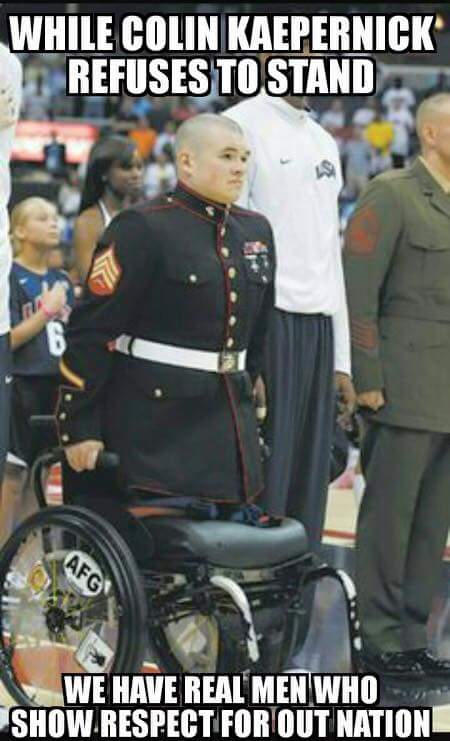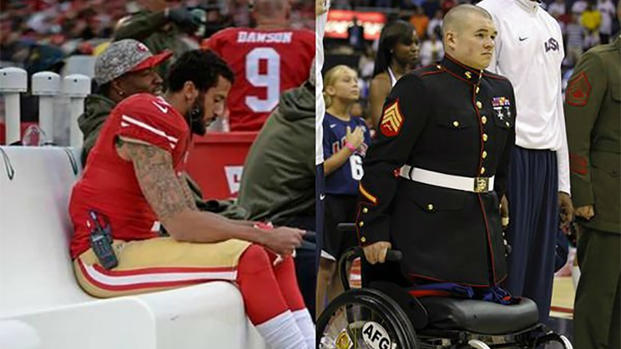After San Francisco 49ers Quarterback Colin Kaepernick sat on the bench during the national anthem at a preseason NFL football game, many in the veteran community became angry. Colin sat during the national anthem and later made a statement saying that he feels he cannot show pride for his nation's flag when it is a nation that oppresses African-Americans and other racial minorities.
In the days following this event, I started to see a slow trickle of Facebook posts from service members, veterans and veteran supporters -- most of them bashing Colin for his actions that day. News outlets even ran straight to veterans -- what do veterans think about this? While one article I read included a pretty in-depth interview with a veteran, the basic set-up was clear: Let's use this combat veteran, hopefully we'll get some sort of juicy reaction out of them! Who could be more angered about this than the combat veteran?
There was one dominant image that kept coming up in my Facebook feed. It was an image of Colin sitting on the bench at an NFL game juxtaposed with a Marine in his dress uniform holding himself up by the handles of his wheelchair with no legs, just the fabric of his dress pants bunched underneath him on the wheelchair seat. The image was captioned with "No legs. No $114 million dollar payday. Still stands for the national anthem." In the meme version, the picture had big block letters scrolled across it that said: "While Colin Kaepernick refuses to stand, we have real men who show respect for our nation." There's no name, no context, just a photo of this Marine being used by other veterans in the same way that they are often used by the media -- as props to make a point.

The image is of Marine Corps Sgt. Zachary Stinson of Chambersburg, Pennsylvania. He lost both his legs and has damage to his hands from an improved explosive device while serving in Afghanistan in 2010. The picture was taken at an exhibition basketball game in July 2012 for the Olympic men's basketball team in Washington, D.C.
The Facebook post, the meme, the side-by-side image of Colin and Zachary -- none of this was produced by Zachary himself. If it had been, I wouldn't be writing this article. Instead, Zachary's image was used to craft a message that wasn't his.
The misappropriation of images of wounded veterans isn't something new to this community. One veteran I interviewed for my dissertation research had a short video clip of him immediately after being wounded that was floating around various media sources. When it was used by an organization in a way that he disagreed with, he reached out to them and was successful in getting it removed from their promotional materials.
The use of this snapshot from four years ago in the wake of the Colin Kaepernick scandal is superimposed with assumptions, judgments and meaning that erase Zachary; you don't see the person, you just see him as a wounded warrior. One online publication even led with the headline "US Marine with No Legs Destroys Colin Kaepernick; SPEECHLESS!"
Do you think Zachary enjoys being called the US Marine with no legs? I wouldn't, and I'm guessing he doesn't either. He's a person, and the way he positioned himself for the national anthem during that July day was his own personal choice. It wasn't in opposition to anything, it wasn't a stance for anything -- it was his own way of honoring his country during the national anthem.
I bet you're wondering … what does Zachary think of all this? Did I reach out and ask him about his thoughts? The answer is no, I didn't. Zachary is busy living his life. He's married and has a daughter, and like many of the wounded veterans I've interviewed for my dissertation research, he's probably focused on the things that are in front of him rather than the past that is behind him.
While our national focus and attention on wounded veterans is useful in raising awareness and providing support, it can also hold our veterans back. We tend to box them in and see them as perpetual "wounded warriors" rather than people living their lives.
It is time that we stop using images of wounded veterans for our own pleasure, inspiration or political messages. When we do that, we de-humanize them and their sacrifices.
Wounded, injured and ill veterans are unique and complicated individuals, just like everyone else. Their service and sacrifice should be understood within the context of their own lives and their own words.
If we really want to respect veterans, let's stop using them as tools for our own agendas.
Sidra Montgomery is military spouse pursuing a doctoral degree in sociology at the University of Maryland with a focus on post-9/11 wounded veterans. She also serves on the Military Family Advisory Network advisory board. The views expressed in this commentary are hers.









